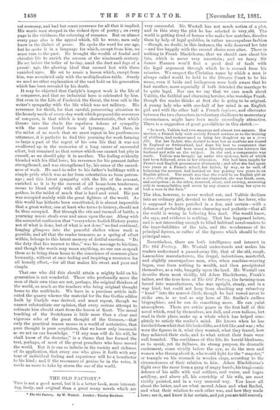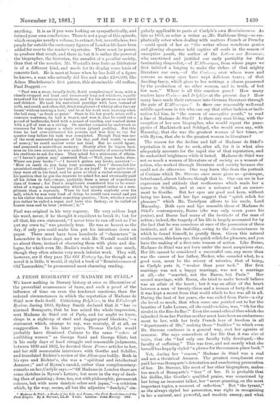THE OLD FACTORT.* Tins is not a good novel, but
it is a better book, more interest- ing, lively, and original than a great many novels which are
• The Old Factory. By W. Westall. London: Tinsley Brothers.
very successful. Mr. Westall has not much notion of a plot, and in this story the plot he has selected is very,old. The world is getting tired of heroes who make low matches, dissolve them by help of legal quibbles, in rather unscrupulous fashion — though, no doubt, in this instance, the wife deserved her fate — and live happily with the second choice ever after. There is nothing in Frank Blackthorne, that we should care about his fate, which is never very uncertain ; and we fancy Sir James Hannen wou!cl find a good deal of fault with the legal argument through which he is rescued from his miseries. We suspect the Christian name by which a man is always called would be held in the Divorce Court to be his name, even if bride and bridegroom were both aware that he had another, more especially if both intended the marriage to be quite legal. Nor can we say that we care much about Valerie, the faithful and charming heroine, who worships Frank, though the reader thinks at first she is going to be original.
A young lady who with one-half of her mind is- an English girl and with the other half a French ingazte, and alternates
between the two characters in voluntary obedience to momentary circumstance, might have been made exceedingly attractive. There is a suggestion of great possibilities in this sketch :—
"In truth, Valerie had two manners and almost two natures. Her mother, a French lady with strictly French notions as to the training of children' had endeavoured to bring her daughter up as a jeune fine. But her fa.her, who desired to rear her as maidens are reared in England or Switzerland, had done his best to counteract that design, and there had been many a friendly contention between the husband and wife on the subject. In the end, a compromise was made. Valerie was brought up under two systems, both of which had been followed, even in her education. She had been taught by French and English governesses alternately ; and after she bad spent two years at a French school, her father, by way, RS he said, of balancing the account, had insisted on her passing two years in an English school. The result was that she could be an English girl or a .ieune fiile at pleasure. In the one character, she was frank, open, and outspoken ; in the other, reserved, silent, and retiring, answering only in monosyllables, and never by any chance raising her eyes to look a man in the face."
The idea, however, is never worked out, and Valerie declines into an ordinary girl, devoted to the memory of her lover, who is supposed to have perished. in a fire, and certain—with a defiance of probability at once charming and pathetic—that all the world is wrong in believing him dead. She would know, she says, and evidence is nothing. That has happened before, and is not interesting enough to blind habitual novel-readers to the improbabilities of the tale, and the woodenness of its principal figures, or rather of the figures which should be the principal ones.
Nevertheless, there are both intelligence and interest in The Old Factory. Mr. Westall understands and makes his readers understand a passed-away life, that of the old, rough, Lancashire manufacturers, the frugal, industrious, masterful, and slightly unscrupulous men, who, when machine-weaving began, rose from nothing to wealth, and then precipitated themselves, as a rule, hungrily upon the land. Mr. Westall can describe them most vividly, till Adam Blackthorne, Frank's father, and the true hero of The Old Factory, the farming-man forced into manufactures, who was upright, steady, and in a way kind, but could not keep from chucking any refractory " hand " into the nearest ditch, though he had vowed never to strike one, is as real as any hero of Mr. Smiles's endless biographies; and he can do something more. He can paint atmosphere. There are entire pages in the first half of this novel which, read by themselves, are dull, and. even tedious, but read in their place, make up a whole which has helped com- pletely to satisfy the reader's mind. He knows when he has finished them what that life looked like, and f eltlike, and was ; who were the figures in it, what they wanted, what they feared, how they achieved their ends, and to what extent their fears were well founded. The sordidness of this life, its horrid bleakness, so to speak, yet its fullness, its strong purpose, its dramatic excitement, come vividly before the eye, as do the men and women who throng about it, who would fight for the " mayster," or trample on his stomach in wooden clogs, according to the circumstances of their relation to him. Adam Blackthorne's flight over the moor from a gang of angry hands, his tragi-comic defence of his mills with real soldiers, real water, and bogus artillery, and above all, his courtship of his wife, are most vividly painted, and in a very unusual way. You know all about the latter, and see what moved Adam and what Rachel, and what their relation to each other was, and how they made love ; see it, and know it for certain, and yet you are told scarcely
anything. It is as if you were looking on sympathetically, and formed your own conclusions. There is not a page of this episode, which occupies nearly a volume, to extract; but, nevertheless, two people far outside the customary figures of London life have been • added for ever to the reader's repertoire. There must be power, to produce that result, and there is, but it is rather the power of the biographer, the historian, the annalist of a peculiar society, than that of the novelist. Mr. Westall's true forte as litterateur is of a different kind, and needs for its display some basis of concrete fact. He is most at home when he has hold of a figure he knows, a man who actually did live and make £200,000, like Adam Blakkthorne's first patron, this abominable old ruffian, Paul Doggett :—
"Paul was a stout, broadly.built, florid complexioned -man, with a closely-cropped red head and immensely long red whiskers, equally renowned for his success in business, and for his prowess as an eater and drinker. He took his matutinal porridge with beer instead of milk, and could, and often did, drink ten glasses of whisky after factory hours without turning a hair,' and be at his work next morning when the bell rang as fresh as paint.' Once in his hot youth, when still a common workman, he laid a wager, and won it, that he could eat a pound of beefsteaks, fried with a pound of candles, and washed down with a gill of rum at a sitting. On another occasion he undertook to consume for his supper a whole rotten (plum) pudding. But this time he had over-estimated his powers, and was fain to cry for quarter long before his task was completed. Though Paul was one of the most successful spinners of his day, and died worth a mint of money,' he could neither write nor read. But he could figure, and possessed a marvellous memory. Shortly after he began busi- ness on his own account, he was under the necessity of coming before his creditors to ask for time. They asked for a statement of affairs. —` I haven't getten any,' answered Paul.—' Well, your books, then.
Where are your books I haven't gotten any books, nawther.'— ' How on earth do you keep your accounts, then ? demanded the astonished creditor.—' I have 'em all in my heyd.' It was quite true; they were all in his head, and he gave so clear a verbal statement of his position that he got the reprieve lie asked for, and eventually paid all his debts in full,—more, probably, from a sense of expediency than of honour ; for Paul's neighbours considered him to be some- what of a rogue, an imputation which he accepted rather as a oom- pliment than a reproach. When he had shown anybody over his mill, which he was very fond of doing, he would turn round and put to his visitor this somewhat searching question, 'Now, whether would you rather be called a rogue and have this factory, or be called an honest man and be bout [without] it.'" Paul was original in his very roguery. He very seldom kept his word, never, if he thought it expedient to break it ; but for all that, his own statement, "I never tries to run off owt as I've put my cross to," was precisely true. He was as honest as the day, if only you could make him put his intentions down on paper. There must have been hundreds of " characters " in Lancashire in those days, and we wish Mr. Westall would tell us about them, instead of obscuring them with plots and dia- logue, for which even Mr. Mudie's readers will not care much, though they often admire very much inferior work. They will, however, err if they pass The Old Factory by, for though as a novel it is little, it would, if styled a book of "Reminiscences of OldIancashire," be pronounced most charming reading.



































 Previous page
Previous page